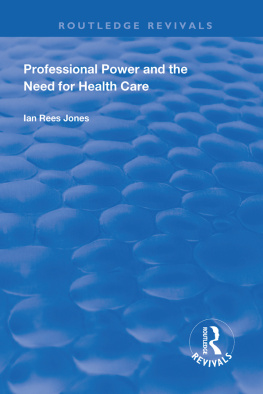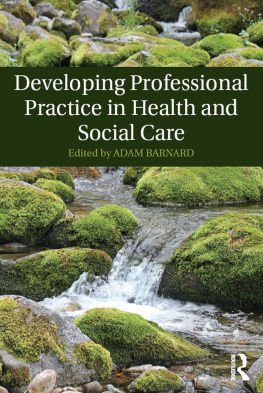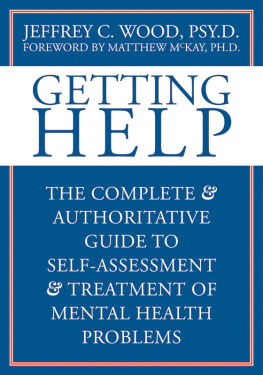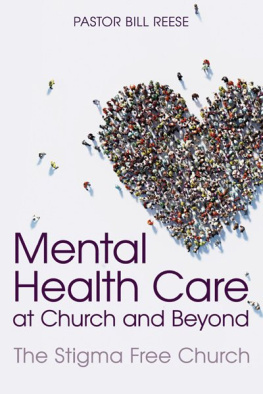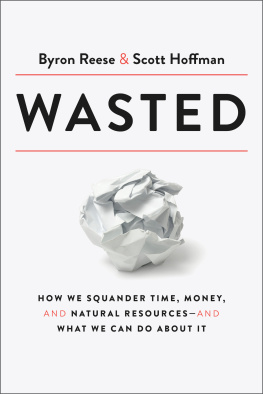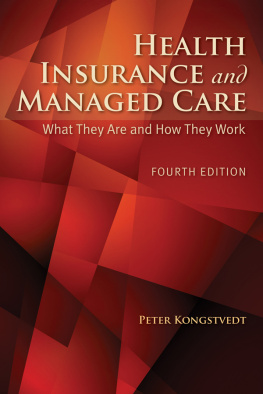Professional Power and the Need for Health Care
IAN REES JONES
Faculty of Healthcare Sciences
St George's Hospital Medical School and Kingston University
First published 1999 by Ashgate Publishing
Reissued 2018 by Routledge
2 Park Square, Milton Park, Abingdon, Oxon, OX14 4RN
711 Third Avenue, New York, NY 10017, USA
Routledge is an imprint of the Taylor & Francis Group, an informa business
Copyright Ian Rees Jones 1999
All rights reserved. No part of this book may be reprinted or reproduced or utilised in any form or by any electronic, mechanical, or other means, now known or hereafter invented, including photocopying and recording, or in any information storage or retrieval system, without permission in writing from the publishers.
Notice:
Product or corporate names may be trademarks or registered trademarks, and are used only for identification and explanation without intent to infringe.
Publishers Note
The publisher has gone to great lengths to ensure the quality of this reprint but points out that some imperfections in the original copies may be apparent.
Disclaimer
The publisher has made every effort to trace copyright holders and welcomes correspondence from those they have been unable to contact.
A Library of Congress record exists under LC control number: 99072601
ISBN 13: 978-1-138-32813-6 (hbk)
ISBN 13: 978-0-429-44887-4 (ebk)
When Margaret Thatcher wrote in the foreword to Working for Patients that the patients needs will always be paramount, the irony of that statement was felt by many inside and outside the National Health Service. Despite this, she was not the first nor the last to use a needs based rhetoric to support a particular ideology. This book is concerned with the language of need, the limits to our understanding of health needs and the consequences of those limitations. In it I attempt to present a critical account of the role of professional power in the UK health system. Theories of need, justice and rights are reviewed in relation to the structural changes the National Health Service experienced in the early 1990s under the Conservative governments NHS reforms. In this sense I examine recent events from the position of having engaged with and to a very small extent participated in some of those events. I am all too aware that this is a dangerous course of action. When asked to summarise the impact of the French Revolution, Zhou Enlai is said to have replied that it was too soon to tell. The claims made in this book should be read with at least that dictum in mind and the analysis I present should be seen as an attempt to provide a critique of health policy in the NHS using a particular framework. This framework incorporates Doyal and Goughs Theory of Need with Habermas notions of the demise of the public sphere. An independent review of renal services in London is used as an exemplar concentrating on the needs assessment work of the review group and the decision making debates this review group engaged in. By using a Habermasian perspective to investigate the ways in which the language of need was used in debates the distorting effects of professional power are investigated. Finally, the findings from this exemplar are used to inform a discussion of the relationship between understandings of health care needs, rationing and rationality and the implications this has for health policy in the UK. Although I adopt a critical approach, the work of this review group was a remarkable achievement given the constraints it experienced. This achievement was due to the knowledge and commitment of the review group members. I believe however that the high quality of their work adds strength to the critique I develop in this book and in particular should raise questions about the nature of decision-making in the NHS.
This book would never have seen the light of day had it not been for the generosity and support of a number of people. I am indebted to Sarah Curtis, Len Doyal, Sheila Hillier, Netar Mallick, Graham Moon, Edward Oliver and Ann Taket for their advice and support, and to the members of the renal review group for their co-operation. I am grateful to Paul Higgs for his advice and encouragement.
The NHS was originally set up on the basis that it would provide universal health care to all, free at the point of need. Webster (1995, 1998) and Harrison et al (1990) have argued in different ways that from the very beginning the NHS was very much a hasty compromise. Klein (1983) on the other hand (among others) argued that the NHS was conceived and born from a political consensus. Despite their differences these commentators appear to be in agreement on at least one thing and that is early descriptions of the NHS as a needs based service were more a product of rhetoric than reality. As we shall see the rhetoric of need has unfortunately sustained the idea of a NHS born of political consensus when its history has been, and continues to be, one of conflict (Higgs 1993). It is well known that since its inception the concept of a free service has been redefined and the ability of the system to respond to needs has been continually questioned. The image of the NHS as a universal service is however strongly supported by the British public. This may be due in no small part to marked improvements in the health of the British public over the course of the twentieth century. Explanations for improvements in health have been the focus for considerable debate. McKeown (1979) has argued that most of the improvements in life expectancy and in health status from the 17th century onwards can be attributed, in the main, to improvements in socio-economic conditions and not to the developments made in modern health care. His thesis has been criticised for understating the impact of local politics and public health interventions (Szreter 1988) and for underplaying the role of health services (Mercer 1990), particularly in the period after the inception of the NHS. A question mark still remains over the impact of modern medicine in this post war period, whether this is raised by the critiques of radical doctors (Cochrane 1971) or by those starting from a Marxist tradition (Doyal 1979). Whatever the arguments surrounding improvements in population health status since 1948 it is clear that these improvements have not meant the disappearance of inequalities in health. Indeed, inequalities in health have persisted (Townsend and Davidson 1982) and during the decade of the eighties these inequalities have been seen to increase and have been attributed to the relationship between poverty and health (Whitehead 1987, Marmot 1989, Phillimore et al 1994, Bartley Blane and Davey Smith 1998, Acheson 1998).
It is against this background that we should view any changes to the structure of the NHS system itself as well as what motivated these changes. The history of structural and organisation change in the NHS has been sketched by Roberts (1992) as a progression through three periods; the administrative period, the planning period and the management period. In the 1980s, when the system moved into the management period, questions began to be asked about, not only the structure of health service delivery, but also about the supply and demand for health care and the way that health care could be financed in the future (Culyer, Donaldson and Gerard 1988). Such questions were prompted by Conservative views of the NHS as an inflexible and wasteful bureaucracy. They were to be disappointed by reviews that argued against a radical reform of the financing of the NHS and so the Thatcher government turned towards radical initiatives on the structure of the NHS. The capacity of quasi-markets1 to introduce competitive disciplines to the public sector offered an attractive solution to the problem (Enthoven 1991), and led to the NHS reforms of 1991.


